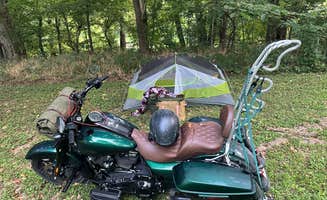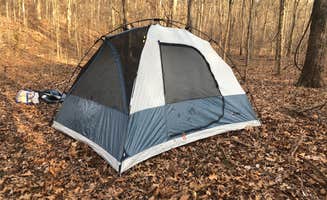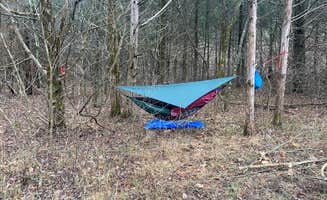Dispersed camping options abound within the Mark Twain National Forest and surrounding areas near Rolla, Missouri. The region offers primitive camping experiences at elevations ranging from 700 to 1,400 feet across diverse Ozark terrain. Summer temperatures typically reach 85-95°F with high humidity, while spring and fall provide milder conditions with occasional precipitation and temperatures between 55-75°F.
What to do
Fishing opportunities: Multiple sites offer access to stocked waters. At Big River Primitive Campground, visitors can enjoy "clean crisp water from the river at its origin" according to Jeremy G., who found the spot "quiet and perfect." The water quality makes it ideal for both casual and sport fishing.
Hiking trail access: The region connects to extensive trail systems. Matt S. notes that when hiking the Ozark Trail, "Big River isn't really a river but it is a reliable creek with a beautiful setting. It has a nice fire pit with plenty of large logs for seating." Many primitive sites serve as ideal basecamps for day hikes or multi-day backpacking trips.
Wildlife observation: The conservation areas provide excellent wildlife viewing opportunities. Katie B. reports from Sunklands Conservation Area that they "had a great time exploring the outdoors - saw no other people and only heard nature and airplanes." Early mornings and evenings typically offer the best wildlife viewing conditions.
What campers like
Remote solitude: Many campers appreciate the isolation these sites provide. At Sunklands Conservation Area, Katie B. describes it as "great for those who want to be alone," noting "there are no sites you just pick your spot." This open camping format allows visitors to select locations based on privacy preferences.
Water features: Natural water sources enhance the camping experience. Cody S. describes Timberline Lake Dispersed as a "peaceful night, very off the beaten path," mentioning "there is a boat launch that's steep and rough." This access point allows for fishing and small watercraft use despite the challenging entry.
Abundant wildlife: The forest setting supports diverse animal populations. Chris J. notes at Little Scotia Pond that you'll "probably hear the beaver if you stay at one of the two sites by the pond," and there was a "decent amount of wild life hanging around." Campers should maintain appropriate food storage practices due to this wildlife activity.
What you should know
Vehicle requirements: Many sites require appropriate vehicles for access. Nicholas H. warns about one location having a road that "isn't a road so much as a ATV trail. All wheel drive and it was too hard on my Subaru. Mostly washed out." High-clearance vehicles are strongly recommended for most sites.
Seasonal challenges: Weather conditions significantly impact accessibility. At Little Scotia Pond 4x4 Dispersed Site, Malik H. notes it's "easy to get in but could be tricky for a small car to get out (boulders, trees, incline and possible rain/mud) 4x4 recommend." Spring rains can make roads impassable even for suitable vehicles.
Insect preparation: Biting insects are prevalent, especially in warmer months. Linda C. encountered "aggressive horseflies and mosquitoes" and "lots of sewer flies in the vault toilet" at Brazil Creek. Another camper mentions, "there are lots of insects that will attack you on your walk." Appropriate repellent and protective clothing are essential during peak seasons.
Tips for camping with families
Site selection: Choose locations with flat terrain and natural barriers. At Brazil Creek Camping Area, James D. found "very nice free camp ground that is suitable for any type of camping" with "miles and miles of trails for Mountain Biking, horse riding or just hiking." These diverse activity options make it suitable for families with varied interests.
Toilet considerations: Most dispersed sites lack facilities. Mike L. recommends Brazil Creek, noting it has "good access to the Berryman Trail," but cautions "this site is pretty remote from any services." Families should bring portable toilet facilities and proper waste disposal equipment.
Tick prevention: Implement thorough tick checks during active seasons. Chris J. advises, "Be mindful that it is tick season now. We had a few on the dog by the end of the first day." Daily body checks and appropriate clothing treatment are essential, particularly when camping with children and pets.
Tips from RVers
Size limitations: Most sites accommodate only smaller recreational vehicles. At Toronto Springs Dispersed, Zachary C. describes "completely free clean and shaded" camping but doesn't mention RV-specific amenities. The primitive nature limits accessibility for larger rigs.
Supply planning: No services exist at most locations. James D. notes you should have "good service with AT&T" at Brazil Creek with a booster, but advises being "well worth the 20 to 30 minute trip off the highway." Mike L. reinforces this advice, suggesting visitors "stop in Sullivan or Bourbon, MO for supplies" before arrival.
Leveling challenges: Natural terrain requires leveling equipment. Dave N. indicates some locations like Little Scotia Pond might accommodate "a small class c or travel trailer" but are "best for vans and tents." Proper leveling blocks and stabilizers are necessary for the uneven terrain found throughout these rustic camping areas near Rolla.




